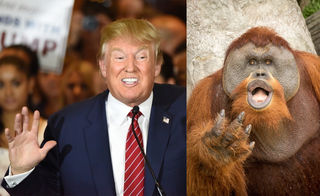President Donald Trump
Why Trump?: Donald the Dominant Male Ape
Evolutionary psychology explains Trump's appeal.
Posted February 28, 2016

Trump’s meteoric rise in the 2016 Republican primaries has gained worldwide attention, above and beyond the usual spectacle of American politics. For his divisive and off-color rhetoric—e.g., Mexico sends America its drugs, criminals, and rapists; or America should impose a “total and complete shutdown” of Muslim immigration—world leaders, intellectuals, and civilian spectators across the globe have come to regard Donald Trump as brash, loud, incendiary, or even dangerous: Mexican president Felipe Calderon called Trump “completely crazy”; British Prime Minister David Cameron labeled Trump’s rhetoric as, “divisive, stupid, and wrong”; Saudi royal family member Alwaleed bin Talal Alsaud tweeted of Trump “You are a disgrace not only to the GOP but to all America”; Harvard political theorist Danielle Allen has even called him a “demagogic opportunist” and compared him to Hitler. Indeed, the Donald may have even pissed off the pope.
Despite Trump's talent to inflame, there is no question that he also exudes a mesmerizing, magnetic pull that has drawn in a stunningly large swath of American (mostly right-wing) supporters. This draw has dumbfounded many, on both sides of the political spectrum. I argue here that, as with most of human psychology, the best way to understand the appeal of men like Donald Trump is to consider the evolved nature of the human brain.
We humans spent 99% of our evolutionary history in small bands of hunter-gatherers. Because we have achieved the tenor of our current lifestyles within such a short span of our species’ history, our brains remain calibrated for our ancestral environments. Notably, intergroup violence was far more common in those environments than it is today, and powerful, aggressive males played a key role in the tribe’s survival—by providing physical protection against outsiders, by securing and defending territory (which contains resources essential for survival), and by conducting raids to steal resources from outside groups.
Trump’s popular appeal stupefies the rational observer because his appeal does not reside on the plane of rationality. Rather, his personality resonates with the evolved mind of his followers, in emotionally familiar ways that may not even be entirely conscious. Satirical, yet probably accurate video interviews of Trump supporters show them often stutteringly unable to articulate exactly why they support him. Although meta-analytic studies find that extreme right-wingers tend to have lower cognitive abilities,1 this response may also reflect the fact that many of our evolved desires, preferences, and fears operate below the level of conscious awareness—resulting in what eminent evolutionary psychologists Leda Cosmides and John Tooby refer to as instinct blindness.
We rely then on scientific research to overcome instinct blindness, and studies on leadership preference are revealing. Research has found, for example, that humans prefer leaders who are taller and have more masculine features2 such as square jaws and pronounced brows—which are produced by testosterone, a hormone associated with aggression and strength—and that this preference is heightened in the context of war.3 Such preferences highlight a long primate history in which size and strength in male leaders was critical for our survival. These evolutionary preferences remain strong, even though today we don’t require political leaders to actually represent us in physical combat.
Donald Trump is nothing if not a man who exudes masculine primate bravado, from his way of making more noise than his male political rivals, to his efforts to make them appear weak—most plainly when he taunted Jeb Bush by repeatedly calling him “weak”. This approach to competing with other males would seem to be emotionally familiar to the primate brain, and for many the Republican debates have effused a certain male chimpanzee aroma (Although political satirist Bill Maher has repeatedly pointed out the similarity between Donald's hair color and the male orang, chimpanzees are by far the more aggressive of our cousin species). Not incidentally, male primates in this competition have gone out of their way to highlight their fighting prowess—Republican candidate Ben Carson, for instance, reported that in his youth he tried to stab someone during an argument, and stated, “I would go after people with rocks, and bricks, and baseball bats, and hammers”. During a democratic national debate Jim Webb boasted with a smile about having killed an enemy soldier in Vietnam. When an audience member began protesting at his campaign rally in Nevada, Trump exclaimed, “I’d like to punch him in the face, I tell ya!”…to roaring applause. The history or desire for violence is not hidden from the pubic view, but intentionally broadcasted, particularly among males, which speaks volumes about our evolved minds.
Fear also plays a role, and a demagogue by definition is a political figure who plays upon the fears of his followers. By claiming that our neighbors to the south send us rapists, and stating that he would ensure that they finance a wall to keep themselves out, Trump simultaneously addresses a primitive need to protect women (warring tribes often stole and raped each other’s women), define territory (in plainest terms possible, by erecting a literal barrier along our border), preserve resources (by making Mexico pay for it), and ensure our safety more generally from drug dealers and rapists. Other leaders might address our evolved fears in more sublimated ways. Trump’s game is simply being incredibly concrete about it all.
Interestingly, a large body of research shows that people on the right side of the political spectrum are in fact more fearful. For instance, in the research lab Republicans are far more likely than Democrats to project threatening emotions, such as anger, onto images of people making ambiguous facial expressions.4 Other research has found that when shown threatening pictures—for instance, of a spider on the face of someone showing intense fear—those with more conservative attitudes had more fearful reactions.5 Conservatives have consistently been found to be more xenophobic (fearful of outsiders) than liberals,6 and one imaging study found that conservatives had a larger amygdala7—an ancient region of the brain designed to produce defensive emotions such as fear and anger. This kind of threat sensitivity makes Trump supporters particularly receptive to his dominant male antics.
Trump has also won wide support from evangelical Christians, despite all the factors that would seem to make this impossible—his three marriages, his changing stances on abortion, his fumbling with Bible passages (“Two Corinthians”). Yet again, Trump’s appeal goes deeper than the spoken word (or misspoken as it were)—he is skilled at titillating parts of the evolved brain designed to light up in the presence of dominant males. As I describe in Alpha God, the Judeo-Christian God has all the features of a dominant male human. As such He too “speaks” to the primate brain by providing life-sustaining resources (e.g. “Behold, I will rain bread from heaven” [Exod. 16:4]), acquiring territory, and protecting against outsiders (e.g., “I will drive out nations before you and enlarge your territory.” [Exod. 34:24]). Here I am not making a pun about Trump’s God complex. But if Christians, who tend to be conservative (and threat-sensitive), come pre-primed to seek comfort from the presence of dominant male archetypes, then Donald Trump is bound to have intuitive appeal. Even Trump’s anti-Islamic rhetoric emerges as right in line with the Christian god’s history of leading the charge against outside religious competitors—as if he were a dominant male political representative of a dominant male god in heaven.
In essence, Trump has done what male primates have been doing since before modern humans even existed—assuaging evolved fears of outsiders by targeting outside enemies and protecting territorial borders, if only rhetorically in Trumps’s case. Even so, the dangers of Trump’s demagoguery are legitimate. Consider the international recoil to his boast that he’d “bring back a hell of a lot worse than waterboarding”. The question remains whether, in our increasingly small global community of interdependent nations, we want to be represented by a figure who returns us to our most primitive, tribalistic origins.
References:
1. A. Van Hiel, E. Onraet, & S. De Pauw. (2010). “The Relationship Between Social-Cultural Attitudes and Behavioral Measures of Cognitive Style: A Meta-Analytic Integration of Studies. Journal of Personality, 78 (2010).
2. A.C. Little et al.,“Facial Appearance Affects Voting Decisions,” Evolution and Human Behavior 28 (2007);
3. D. E. Re et al., “Facial Cues to Perceived Height Influence Leadership Choices in Simulated War and Peace Contexts,” Evolutionary Psychology 11, no. 1 (2013).
4. J. Vigil “Political Leanings Vary with Facial Expression Processing and Psychosocial Functioning,” Group process & Intergroup Relations, 13 no. 5 (2010).
5. D.R. Oxley et al. “Political attitudes vary with Physiological Traits” Science 321 no. 5896 (2008).
6. For an excellent review see: A. Tuschman. Our Political Nature. Prometheus: Amherst, NY (2013).
7. R.Kanai, T. Fielden, C. Firth, & G. Rees, “Political Orientations Are Correlated with Brain Structure in Young A




